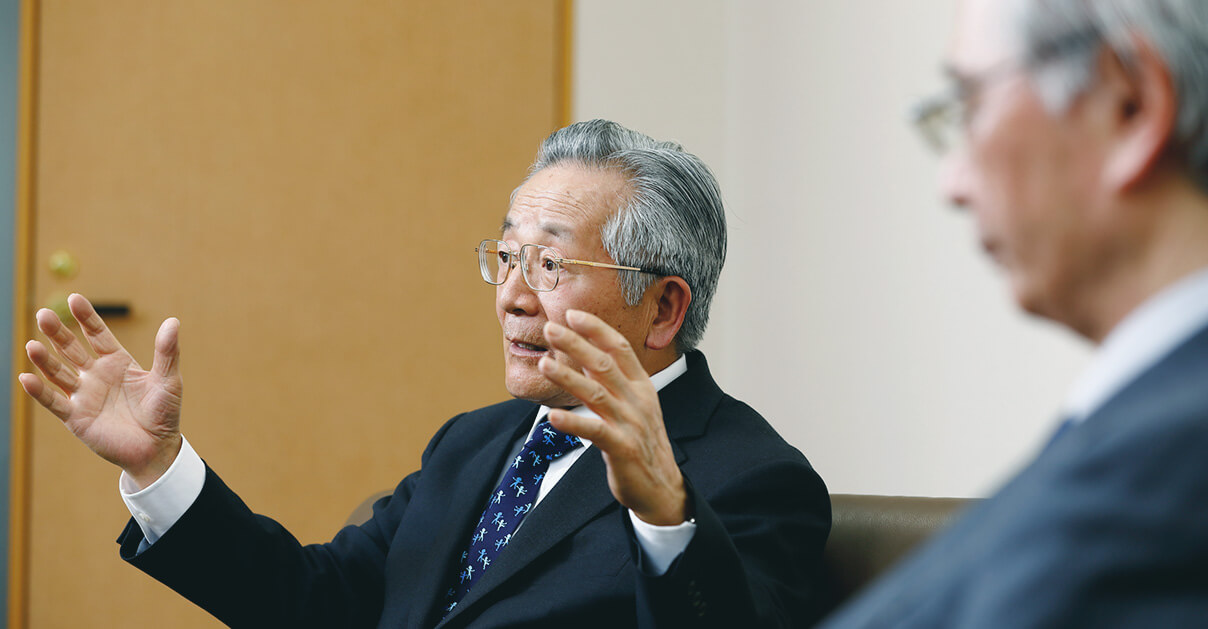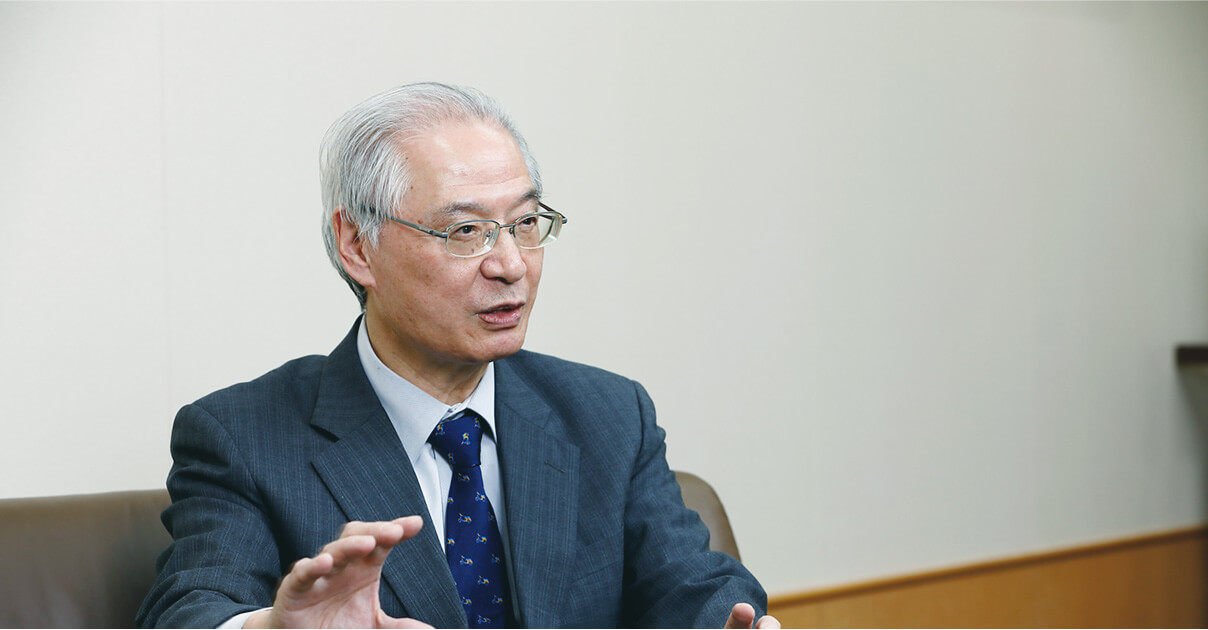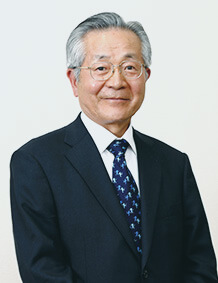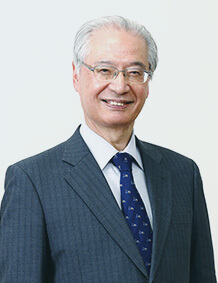TOP > 特別対談

 Cultivating Students’ Ability to Survive an Age of Rapid Changes
Cultivating Students’ Ability to Survive an Age of Rapid Changes
安齋
改元を機にこの30年間を振り返ると、平成は阪神淡路大震災や東日本大震災などの自然災害が多い時代でした。一方で、冷戦の終結、経済の自由化、グローバリゼーションの本格化と、世界の進む方向に展望を持ちやすい時代であったといえます。しかし、近年は反グローバリゼーション、自国優先主義など、これまでとは異なる動きが出始め、予測の難しい時代を迎えています。この混迷の時代を生きていくには世界で何が起きているのかを知り、日本が世界からどう見られているのかを知る必要があります。その上で、学生には自ら考えて行動し、課題を解決していく力を身に付けてほしいと思っています。
竹村
学生も社会の変化を感じとっているようです。本学は、2014年に文部科学省のスーパーグローバル大学創成支援に採択され、「国際化」を教育の柱の一つとして力を入れてきたこともあって、グローバル志向の学生が増えました。様々な海外経験・異文化交流の機会を用意し、大学全体で「グローバル人財(=人という財産)」の育成を推進しています。
安齋
私が若いころは海外との接点をもつチャンスがなく、就職して海外赴任が決まり、そこで初めて異文化交流を体験しました。宗教も文化も違う外国の人たちとコミュニケーションを図る中で気付いたのは、日本の伝統や文化を相手に伝えることの大切さです。誰しも異文化を学ぶ際には自国の文化と比較します。相手に日本のことを伝えられなければ、まともに会話が成り立たないのです。
竹村
おっしゃるとおり、異文化交流のためには自国を知ることこそ重要です。語学力や異文化を理解し活用する力は多くの人がその必要性を感じていますが、実は自国の文化をきちんと相手に伝えられる「自文化理解・発信力」も大切です。本学の基盤教育には「国際人の形成」という科目群があり、言語や情報等のコミュニケーション関連科目に加えて、百人一首などの日本の伝統文化や地域文化を学べる科目を数多く開講していますから、学生には積極的に履修してもらいたいと思っています。
安齋
そういった教育を学校経営の面からも後押ししていきたいと考えています。そして学生にはぜひ外から日本を見てほしい。普段と視点を変えてみることが大切で、外国に行って日本を見ると、日本の良いところに改めて気付けるはずです。
竹村
創立者の井上円了先生は生涯で3回の大きな海外渡航を経験されました。「それぞれの国がそれぞれの伝統を守ることで独立を守っていることに気付いた」とおっしゃっています。
Anzai:
Let me look back at the past three decades, taking advantage of the opportunity presented by the transition to a new imperial era. The Heisei Era saw a large number of natural disasters in Japan, including the Great Hanshin-Awaji Earthquake and the Great East Japan Earthquake. Meanwhile, given the end of the Cold War, our increasingly liberalized economies, and the start of full-fledged globalization, I recognize that the era also gave us prospects of a brighter future for the world. Over recent years, however, there have been different trends than before, represented by anti-globalization movements and the dominance of the principle of putting one’s own country first, which prevent us from making easy predictions about the future. Surviving this chaotic age requires us to know what is occurring in the world and how Japan is seen from outside perspectives. For this purpose, I hope that students will acquire the capabilities to act and solve problems based on their own thinking.
Takemura:
It seems to me that students have also detected social changes. Since Toyo University was selected for the Top Global University Project promoted by the Ministry of Education, Culture, Sports, Science and Technology in 2014, we have devoted energies to internationalization as one of our educational pillars, and, consequently, a larger number of students are now more globally oriented than before. We offer them a wide range of opportunities to study or receive training abroad and participate in cultural exchanges, to promote the university-wide initiative to develop globally effective human assets.
Anzai:
When I was young, I had few opportunities to have contact with overseas countries, and I was unable to have a hands-on cross-cultural experience until I was assigned to work abroad after joining the first company I worked for. My experience of communicating with non-Japanese people with diverse religious or cultural backgrounds made me recognize the importance of sharing Japanese traditions and culture with those people. Learning about a culture other than yours always involves a comparison of it with your own culture. You cannot have any meaningful dialogue with people from a culture other than your own without appropriately sharing your culture—Japanese culture in my case—with them.
Takemura:
As you just pointed out now, interacting with people with different cultural backgrounds from us requires us to know much about our own culture. While many of us recognize the importance of language proficiency and a good understanding and mastery of cultures different from ours, I believe that a good understanding of our own culture and the ability to share it with people from different cultural backgrounds are also essential for us to have our culture understood by people around the world. Toyo University’s General Education courses include “International Human Resource Development” courses, which comprise not only of communication-related courses in languages, information, and the like, but also many courses dealing with some elements of traditional Japanese culture, such as the classical Hyakunin Isshu (One Hundred Poets, One Poem Each) poetry anthology, and regional cultures in Japan. I hope that students are interested in taking these courses.
Anzai:
We in university management hope to encourage such educational initiatives. I also hope that students will look at Japan from outside perspectives. Sometimes taking a different perspective from the usual one is quite important. I believe that students can become aware of Japan’s strong points when they look at it from abroad.
Takemura:
Dr. Enryo Inoue, the Toyo University founder, made three important overseas tours in his lifetime. He stated, “I noticed that each country maintains its independence by preserving its own tradition.”


竹村
本学は建学の精神として、井上円了先生の言葉である「諸学の基礎は哲学にあり」「知徳兼全」「独立自活」を掲げています。これらは今まさに高等教育において求められていることです。
急激に変化する現代社会では解のない事態に遭遇した際に、自分で判断し行動できるかが問われます。常識や先入観を捨て自ら主体的に深く考えるという「哲学すること」は、まさに現代で求められる資質です。
また、「知徳兼全」は知性と徳性のどちらも兼ね備えること。学力だけでなく、問題解決能力や協調性、リーダーシップなどの人間力の育成も求められています。「独立自活」は多様な意味合いを持ちますが、その一つは主体的に学ぶ姿勢。自ら課題を見出し、そのために必要な知識や情報を自ら獲得する自学自修です。
安齋
以前、私は銀行で人事採用部門も担当していましたが、企業が採用したいのはまさにそういう人材です。社会へ出た後も学びと努力は生涯続き、それに耐えうる力は学生時代に培われますから、そうした「生きる力」を身に付けた人材を育成したいと考えています。
竹村
近年はキャリア教育としてインターンシップやボランティア活動を単位化し、学生に多様な体験の機会を提供しています。産業界もインターンシップの充実を図っており、今後も社会と連携した教育を推進していきたいと考えます。また、実際に社会でどういったことが起きているのかを知ってもらうため、各界の第一線で活躍されている方々を招いたトップセミナー等も開催しています。理事長にも就任以前にご講演いただきました。
安齋
現役の経営者の方などに直接話を伺えることは大変貴重で、学生の将来の指針にもなります。私もほかの方の講演を聴いて非常に有益な機会と感じました。現代社会は多角的な連携関係で成り立っています。こうした実社会と連携した教育活動に加え、異分野間での交流・連携は今後ますます重要になっていきます。
竹村
分野間連携の一例として、「文・芸・理」の融合を掲げる情報連携学部では、異なる専門分野の学生たちが少人数のチームを組み、現代の社会の課題・テーマに取り組んでいます。今日の社会では専門性が異なるメンバーが連携し仕事を進めるのが当たり前ですから、より実践に近い学びができるというわけです。
安齋
学生の成長を促すために我々がすべきことは、学びの選択肢を増やすこと、考えるきっかけとして刺激を与えること、そしてより高度な教育を受けられる環境を整えることだと考えています。その一環として、2021年には赤羽台キャンパスにライフデザイン学部等を移転するなど、教育・研究環境のさらなる充実を進めています。
Fostering the ability to live based on the founding spirit
Takemura:
Toyo University has long cherished its founding spirit: “The Basis of All Learning Lies in Philosophy,” “Integrating Knowledge and Virtue,” and “Independence and Self-Initiative.” All of these are needed in higher education today.
What is at stake in our rapidly changing contemporary society is your ability to act based on your own decisions when you encounter issues that have no established solutions. The readiness to put philosophy into practice, that is, to think deeply using your own initiative, giving up conventional ideas and prejudices, is really indispensable in contemporary society.
“Integrating Knowledge and Virtue” denotes having both intelligence and a virtuous character. We need to cultivate not only students’ academic ability but also their human capacities, including problem-solving skills, a spirit of cooperation, and leadership. Furthermore, the diverse implications of “Independence and Self-Initiative” include a positive attitude toward proactive learning, that is, the motivation to learn by oneself by identifying problems for oneself, and acquiring knowledge and information necessary to solve the problems without relying on anyone else.
Anzai:
Since I was engaged in recruitment at a bank, I understand that companies want to recruit talent of the type you have just described. Because learning and making tireless efforts are not only for students but endless human endeavors, and the preparedness to endure the undertaking of such endeavors is cultivated during our school days, I hope to foster human resources with such preparedness, which we could call the ability to live.
Takemura:
We have recently begun to offer a wider variety of opportunities for hands-on experience by adopting a system for career education whereby students can earn credits from internships and volunteer activities. Given that industry has also promoted student internships, we hope to pursue education through collaboration with society. In addition, to allow students to be aware of what is actually happening in society, we hold Top Executive Seminars and other events, with leading figures invited as guest speakers from various fields. Chairman Anzai, you spoke on such an occasion before assuming your current position, didn’t you?
Anzai:
I believe that the opportunities to listen directly to active corporate managers or the like are very valuable to students, and give them guidelines for their future. When listening to lectures given by guest speakers other than myself, I noticed that those opportunities were very helpful. Contemporary society is founded on multifaceted collaboration. In addition to educational activities through collaboration with society outside the University, I believe interactions and collaboration between diverse fields will become more and more important from now on.
Takemura:
Taking an example of collaboration between diverse fields, the Faculty of Information Networking for Innovation and Design (INIAD), which aims to integrate the humanities, arts, and sciences, challenges students majoring in different fields to form small groups and collaborate with each other in tackling various problems and themes in contemporary society. In society today, it is nothing special for people from various specialized fields to collaborate at work. Therefore, INIAD students can learn in a way that more closely resembles practical ways of working.
Anzai:
I believe that to facilitate students’ self-development we must offer them many more learning opportunities, inspire them to think, and create a favorable environment in which they can receive higher-quality education. As part of our efforts for those purposes, we are now further upgrading the University’s educational and research environments by planning to relocate the Faculty of Human Life Design to the Akabanedai Campus in 2021.


安齋
企業経営と比べると、学校経営には特有の難しさがあります。大学は毎年4分の1ずつ学生が入れ替わるわけですが、それだけの顧客が入れ替わる産業などありません。また、学生は単なる「お客さま」ではないので、大学は学生に満足してもらうだけでなく、人材を受け入れる社会からも評価されなければなりません。卒業した学生が、10年後、20年後も評価され続ける教育こそが学校経営の大黒柱と位置づけ、その実務を担う教職員が一丸となって取り組める環境・体制を整えることも私の役目と思っています。
竹村
本学は国際社会で評価される大学となることを目指しています。特に、AIやIoTといった先端研究、国連が定めたSDGs達成に寄与する研究など、地球レベルの課題解決に貢献し得る研究力の向上を図り、国際的評価を高めていきたいと考えています。また、海外大学との共同研究等を活発にすることでますます評価が高まれば、世界中から優秀な学生が本学へ集まるようになり、さらなる発展が期待されます。
さらに、学生の成長を可視化し、教育の質を保証するため、これまでにない学修成果測定システムの構築を目指して検討を重ねています。
常に考えているのは、学生を有為な人材として社会に送り出すこと。井上円了先生は、哲学には知識を追求して真理を解明する「向上門(こうじょうもん)」と、学んだことを駆使して人々に利する「向下門(こうげもん)」があり、「向上するは向下せんためなり」とおっしゃいました。つまり、知識の追求や真理の解明は、それを社会に応用し役立ててこそ意味があって、それをしなければただの自己満足に過ぎないといわれるのです。東洋大学の心「他者のために自己を磨く」は、この考え方に基づくものです。大学としてはこういうマインドを持った人財を育てていきたいと思っています。
To achieve greater social recognition for the competency of human assets produced by the University
Anzai:
Compared with corporate management, school management is difficult in its own particular way. While a quarter of the students at a university are replaced by another quarter batch of students every year, no other industry has such a large number of customers replaced by another group every year. Moreover, students are not mere “customers,” so we must not only satisfy our students but also receive due recognition from society as the recipient of human assets graduating from the University. Defining the main pillar of our school management as education that allows students to continue being highly rated 10 or 20 years after their graduation from the University, I believe that my duties include creating a favorable environment and system for faculty and staff members actually pursuing such education to unite in their endeavors.
Takemura:
Toyo University aims to build up its reputation in global society. In particular, I hope to secure international recognition for the University by enhancing the capabilities for research that can help solve global challenges, including advanced research in AI and the IoT and research that can contribute to the achievement of the United Nations Sustainable Development Goals (SDGs). Furthermore, more active joint research with overseas universities and consequent increasing recognition for the University would attract a larger number of excellent students from around the world to the University and enable it to further develop.
In addition, we have had discussions about building an unprecedented system for evaluating students’ academic achievements with the aim of visualizing their development and assuring the quality of education.
I’m always thinking about sending students as competent human assets into society. Dr. Enryo Inoue argued that philosophy has two aspects: kojomon (upstream) and kogemon (downstream), the former of which is an aspect of pursuing knowledge and revealing the truth, while the latter is an aspect of using the learning to best advantage to benefit people. He maintained, “Kojo serves the purpose of koge,” which means that the pursuit of knowledge and the revelation of truth are meaningless if engaged in for self-satisfaction purposes, unless the knowledge and truth are applied to society to benefit people. The Heart of Toyo University—“Improving oneself for the benefit of others”—is based on this principle. I hope that Toyo University fosters human assets with such an attitude.

学校法人東洋大学 理事長 安齋 隆
Chairman, Toyo University Incorporated Educational Institution Takashi Anzai
1941年生まれ。東北大学法学部卒業。日本銀行、㈱日本長期信用銀行(現・㈱新生銀行)頭取、㈱アイワイバンク銀行(現・㈱セブン銀行)社長などを経て、2009年12月学校法人東洋大学理事に就任し、2018年12月から現職。
Born in 1941, Takashi Anzai graduated from the School of Law at Tohoku University. After working at the Bank of Japan, and serving as President of the Long-Term Credit Bank of Japan, Ltd. (present-day Shinsei Bank, Ltd.) and as President of IY Bank Co., Ltd. (present-day Seven Bank, Ltd.), he was appointed as a trustee of the Toyo University Incorporated Educational Institution in December 2009. He has served as Chairman since December 2018.

東洋大学 学長 竹村 牧男
President, Toyo University Makio Takemura
1948年生まれ。東京大学文学部印度哲学科卒業。博士(文学)。専門分野は仏教学・宗教哲学。1975年に文化庁専門職員となり、以降、三重大学助教授、筑波大学教授を経て、2002年から東洋大学教授。文学部長などを歴任し、2009年9月から現職。
Born in 1948, Makio Takemura graduated from the Department of Indian Philosophy and Buddhist Studies at the University of Tokyo’s Faculty of Letters. With a Ph.D. in literature, he specializes in Buddhist studies and religious philosophy. In 1975, he was appointed to serve as an expert at the Agency for Cultural Affairs. After working as an associate professor at Mie University and as a professor at the University of Tsukuba, he joined Toyo University as a professor in 2002. Having served as the Dean of the Faculty of Letters and in other important positions within the University, he became the President in September 2009.

